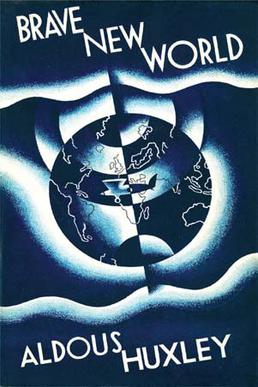Brave New World is a dystopian novel written in 1931 by English author Aldous Huxley, and published in 1932. Largely set in a futuristic World State of genetically modified citizens and an intelligence-based social hierarchy, the novel anticipates huge scientific developments in reproductive technology, sleep-learning, psychological manipulation, and classical conditioning that are combined to make a utopian society that goes challenged only by a single outsider.
Social critic Neil Postman contrasted the worlds of Nineteen Eighty-Four and Brave New World in the foreword of his 1985 book Amusing Ourselves to Death. He writes:
What Orwell feared were those who would ban books. What Huxley feared was that there would be no reason to ban a book, for there would be no one who wanted to read one. Orwell feared those who would deprive us of information. Huxley feared those who would give us so much that we would be reduced to passivity and egotism. Orwell feared that the truth would be concealed from us. Huxley feared the truth would be drowned in a sea of irrelevance. Orwell feared we would become a captive culture. Huxley feared we would become a trivial culture, preoccupied with some equivalent of the feelies, the orgy porgy, and the centrifugal bumblepuppy. As Huxley remarked in Brave New World Revisited, the civil libertarians and rationalists who are ever on the alert to oppose tyranny “failed to take into account man’s almost infinite appetite for distractions.” In 1984, Orwell added, people are controlled by inflicting pain. In Brave New World, they are controlled by inflicting pleasure. In short, Orwell feared that our fear will ruin us. Huxley feared that our desire will ruin us.
Journalist Christopher Hitchens, who himself published several articles on Huxley and a book on Orwell, noted the difference between the two texts in the introduction to his 1999 article “Why Americans Are Not Taught History”:
We dwell in a present-tense culture that somehow, significantly, decided to employ the telling expression “You’re history” as a choice reprobation or insult, and thus elected to speak forgotten volumes about itself. By that standard, the forbidding dystopia of George Orwell’s Nineteen Eighty-Four already belongs, both as a text and as a date, with Ur and Mycenae, while the hedonist nihilism of Huxley still beckons toward a painless, amusement-sodden, and stress-free consensus. Orwell’s was a house of horrors. He seemed to strain credulity because he posited a regime that would go to any lengths to own and possess history, to rewrite and construct it, and to inculcate it by means of coercion. Whereas Huxley … rightly foresaw that any such regime could break because it could not bend. In 1988, four years after 1984, the Soviet Union scrapped its official history curriculum and announced that a newly authorized version was somewhere in the works. This was the precise moment when the regime conceded its own extinction. For true blissed-out and vacant servitude, though, you need an otherwise sophisticated society where no serious history is taught.[29]
